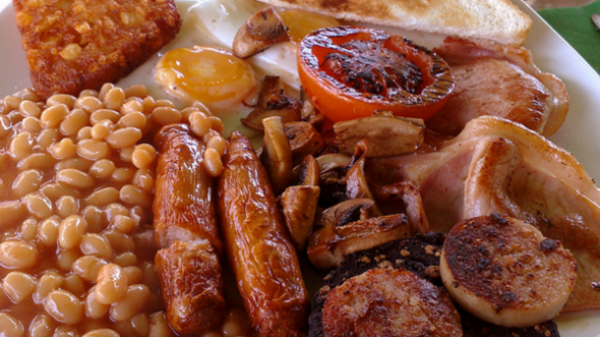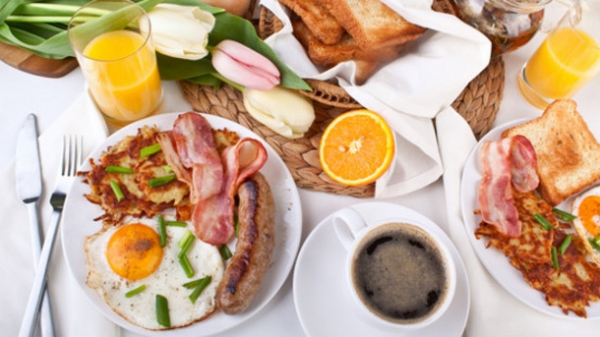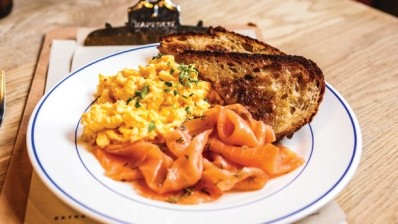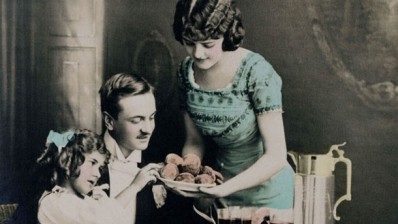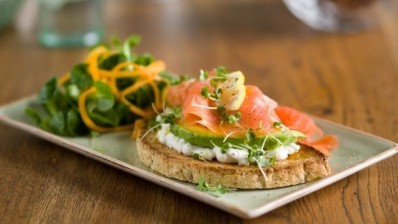Open all hours: how to capitalise on the demand for breakfast
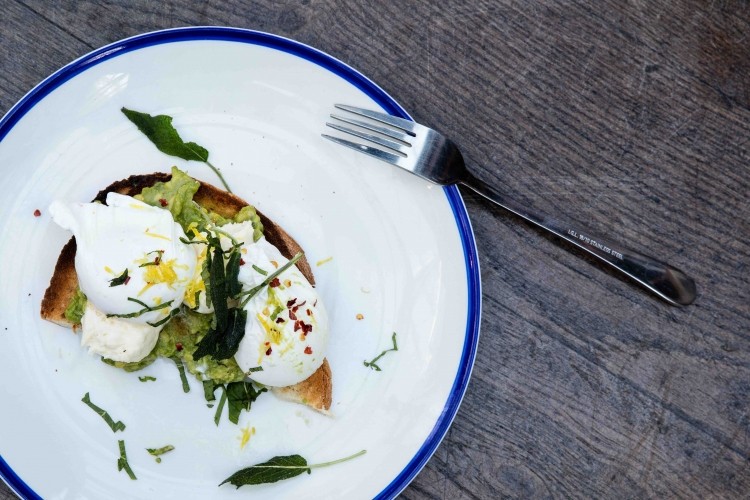
From traditional fry-ups, to anything that includes some form of smashed avocado, what could be better than a fantastic quality breakfast, a good cup of coffee and freshly squeezed juice – perhaps with a splash of bubbles – first thing in the morning?
But for publicans thinking about serving the first meal of the day, extending their pub hours so they are open much longer may require a bit more preparation than just buying a new frying pan and juicer.
It’s all about the revenue
The benefits of jumping on the breakfast bandwagon often speak for themselves in added revenue.
Young’s introduced brunch to its offer a year ago, and has since seen its food sales between 6am and 12noon grow by 9.7%.
Its breakfast and brunch dishes have become so popular in the past 12 months that the pubco has increased its free-range egg purchases by 250,000 to a whopping 1.1m eggs per year.
Its most popular dish – crushed avocado, poached eggs and lemon zest on sourdough toast – has proved so successful that the pubco has bought 174% more avocados this year compared to last.
But how do you know if the demand for longer opening hours is there, particularly if you have a popular greasy spoon round the corner or a lack of passing trade at the front end of the day.
Overnight stays
For pubs that offer accommodation, opening all hours to sell breakfast is not a problem.
Lucy Townsend, owner of the Greyhound on the Test, in Stockbridge, Hampshire, says that offering customers breakfast was a no-brainer because it already provides guest rooms, so it was simply adding to the pub’s revenue.
“We’ve got the staff here, and we’re open anyway, we already do breakfast for overnight residents, so why not do it for everyone else?
“The benefit for the customer is that we are providing a whole experience. We are not just open for dinner and drinks.”
In her 20 years of putting on breakfast, Townsend believes people tend to spend more money at breakfast than at lunch.
“We have also seen an increase in breakfast meetings, so the client doesn’t have to offer alcohol. We are seeing more and more of this and, as a business owner, I think they are brilliant.”
She believes it’s harder for pubs without accommodation to put on a successful breakfast, but it is worth giving it a shot.
Extended hours
If your pub does not offer accommodation, it is very likely you would need to look at extending the hours you operate your business.
Andy Grimsey, partner of licensing specialists Poppleston Allen, says the first thing publicans need to check is what their opening hours are on their licences, and secondly they need to speak to their local council.
“Most councils will say it’s fine if you want to amend your opening hours so you can open a bit earlier for breakfast, you can do this by submitting a minor variation,” said Grimsey.
However, if you plan to sell alcohol with your breakfast, it’s a different kettle of fish altogether.
“If you are looking to sell alcohol earlier than is stated on your licence, you would definitely need to make an application, usually as a full variation,” he says. “This includes a full public consultation and a notice in the pub and newspaper.”
But, be warned, extending your hours [to sell alcohol] has the potential to become costly. “Publicans need to work out whether putting on breakfast is worthwhile,” Grimsey adds.
Considering your staff
If you do want to extend your opening hours, pub managers will also need to ensure there are sufficient staff to serve early bird customers.
Breakfast is a big opportunity for pubs, but licensees need to do their calculations before adding it to their offer, says Star Pubs & Bars food manager Luke Davies. If a pub opens at 8am rather than midday, licensees will be paying extra hours for chefs and front-of-house staff.
According to Melanie Morton, employment associate at Nelsons Solicitors, who advises on a variety of employment law issues, including changes to terms and conditions, it would make “commercial sense” to offer existing staff the opportunity to take these extra hours where possible.
This can save on recruitment and training costs and boost morale, she says.
However, what if the staff do not appear keen? Can you make them work more or different hours to ensure that the extra opening hours are covered or do you have to hire new starters?
“The question of what you can insist on existing staff doing with their working hours starts with what the contract of employment provides for,” Morton explains.
She advises operators to check their contracts because many will contain wording to the effect of “your hours may vary depending on the needs of the business” or “your hours will be based on a rota system notified to you a week in advance”.
This would mean an employer could technically change hours from say 12noon-4pm to 7am-11pm.
However, if an employer wants to vary or increase the working hours of an employee who is on fixed hours, their consent should be sought, she says.
“It is inevitable that some workers will not want to change their working hours, particularly those who are happy with existing part-time hours that suit them or their family or that accommodate certain health conditions,” she continues.
“In that situation, employers need to consider their options carefully. Implementing a change to working hours can be fraught with difficulties, which can be frustrating when you are simply trying to better the business and increase revenue,” says Morton.
“If you are adjusting opening hours and require advice on the effect of this on your staff, we would recommend you seek specialist advice.”
Is there demand?
Before taking a leap of faith, it’s worth checking that the demand for longer hours to provide breakfast is actually there.
Davies says anyone considering this should think about their location. On-trade sites that extend their hours to offer the first meal of the day are most successful where there is a school nearby or city centre passing trade, he says.
“To gauge whether there is a market, operators should assess who is out and about at breakfast time. Is it commuters, local businesses or parents on the school run?
“Find out whether they would use your pub and tailor your offer accordingly, be it bacon butties, full breakfast or takeaway pastries and coffees,” he says.
Richard Thompson, manager of Liverpool-based the Elephant Pub and Bake-house, a Star Pubs & Bars site, says it doesn’t offer accommodation but the site is in the heart of the ‘Liverpool village’, which makes it something of a meeting place.
“We have lots of families and people in the village, many of whom used to pop in for coffee, and we saw there was demand to start offering breakfast.”
His pub has a pantry area, with a coffee machine, trained baristas, and a big sharing table that displays pastries freshly cooked in the pub’s on-site bakery.
Newspapers are on hand and the quality of the food, coffee and the relaxed atmosphere is a draw for everyone from parents on the school run and the coffee morning cohort during the week to families at the
weekend, he says.
“Offering breakfast has been massively beneficial to business and trade, especially on a weekend,” Thompson says.
Young’s, which opens some of its sites extra early, also says it finds its premises are used for meetings, usually by workers and entrepreneurs looking to get a break from the office.
“The pub is the perfect home-from-home location where people can get everything they require, including a plentiful supply of coffee.
“Due to this demand, we have seen a rapid rise in the popularity of brunch, an offering that we have extended to give people even more choice,” said the pubco’s spokesman.
Risks of a bottomless brunch
Being open throughout the day presents opportunities that pubs may not have traditionally considered. One of these is the phenomenon of the bottomless brunch. Think Prosecco and eggs Benedict, for example. However, this is where publicans can fall foul of licensing rules.
Grimsey warns that if you have a promotion that is offering unlimited or unspecified amounts of alcohol for a fixed fee, then, on the face of it, that could appear to be an irresponsible drinks promotion.
“If you have a Prosecco brunch, the test is whether that promotion has a significant risk of undermining one of the licensing objectives,” he explains.
To avoid breaching the mandatory objective, pubs should ensure they operate the right to contractually stop serving in the event they decide the consumer is using the promotion for the “wrong purpose”.
Additionally, publicans should ensure it is a food-led promotion, and an environment is created where customers are not encouraged to drink ‘gallons’ of Prosecco or Champagne – despite the promotion being labelled ‘bottomless’.
Additional small checks
Another piece of advice is to check your planning permission because there may be restrictions in terms of hours or alcohol service.
If you have a pavement licence, also known as a table-and-chairs licence – where operators use a public highway owned by the council to put tables and chairs outside – make sure the legislation covers anything you want to do outside within any new opening hours, Grimsey says.
Get the message out
Being open for breakfast isn’t always enough to pull in the customers, especially when the morning food trade is brimming with competition and pubs are not traditionally known for providing sustenance first thing.
Thompson says pubs can differentiate themselves from the competition by serving good-quality food.
“There are challenges – putting on breakfast can become quite expensive, especially if you get different, good quality ingredients,” he says. “But, if you get it right it is definitely worth it.”
He says it is hard to compete on price if your competitors are charging around £5 for breakfast, but quality is where you can show difference.
“Our feedback is really good, we have quite a varied and interesting menu, that’s not the same quality you would get in a corner café.
“It’s proper restaurant-style breakfast that is all locally sourced. It’s all about fresh quality and great coffee – they are the two things to drive breakfast sales.”
Star Pubs’ Davies agrees, and said: “Don’t try and compete on price, you need to out-do the competition through quality. The market trend is towards premiumisation.”
All-day breakfast
It seems lunch meetings are being replaced with breakfast get-togethers, and Saturday nights out are being swapped for a Sunday morning bottomless brunch.
The tables are turning on what consumers want from the morning meal, and pubs have the staff, equipment, and talent to tap into that with longer opening hours.
We suppose the only question left to ask is, how do you like your eggs in the morning?
